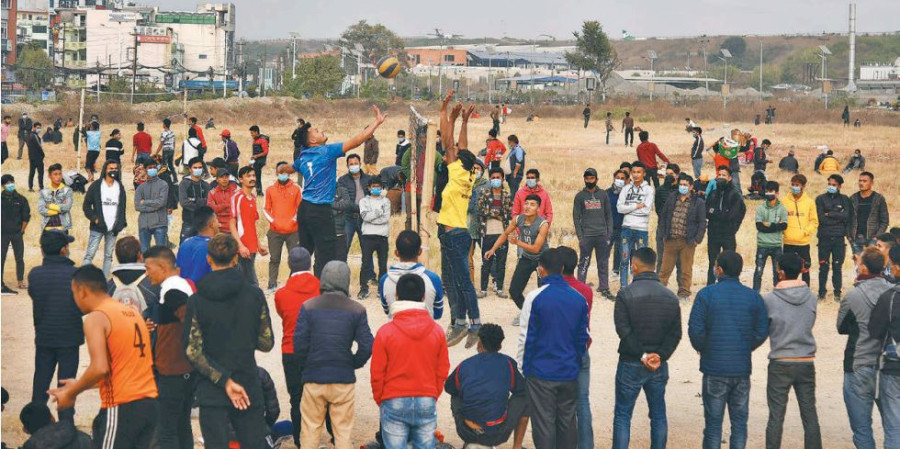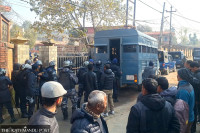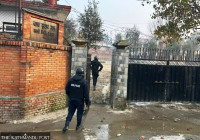Valley
In its latest reincarnation, the derelict space at Tinkune has become a volleyball ground
Most of the players are unemployed youths waiting to migrate for work. They say the game has become a stress reliever while those who set up the courts are making an income.
Anup Ojha
Tinkune Park has had numerous identities over the years. The latest is a hang-out for volleyball enthusiasts.
The triangular land spread over 50 ropanis (2.5 hectares) has half a dozen courts engaging scores of players every day in the sport which in 2017 was declared the national game of the country.
The vast majority of players are those who are in the Capital seeking jobs having lost them because of the Covid-19 pandemic and those who are waiting to go abroad.
“I have been stuck in Nepal for over a year now. I have given my passport to an agent, but due to the Covid-19 pandemic I have not got a visa for Qatar,” said Dinesh Pokharel, 29.
He said Tinkune has become the best place to spend his leisure.
“It's stress relieving. When I go to my room in the evening, I feel refreshed and I can sleep well at night despite the troubles I am going through,” said Pokharel from Okhaldhunga.
Pokharel returned from Qatar in January last year after working there in a construction company for four years.
He has been in Kathmandu for the past three months waiting to go back.
According to a UNDP report published in May, three in five employees lost their job due to the pandemic in Nepal.
Keshav Basnet, another jobless youth, said the ground has become the favourite hub of his for the past three months. He said he has been coming to Tinkune regularly to play volleyball along with his two friends from Ramechhap.
“They are also waiting to get visas to go abroad to work,” said Basnet, who is from Ramechhap. “I have made many friends here.”
Tinkune got its new incarnation three months ago when Anil Magar, another jobless youth, after the lockdown in March bought a volleyball and a net and set up a court.
“At the beginning, I called my friends to play but now many youths come here to play. Some of them are really good players,” said Magar.
He spent his days in his village in Okhaldhunga during the lockdown, but after the nationwide lockdown was lifted he returned to Kathmandu.
“I found myself jobless and had nothing to do,” said Magar.
Soon others also set up courts. Of the six courts, games are regularly played in five while the sixth one has become a practice court.
The operators of the court charge Rs100 per game and with six on each team, each player contributes Rs20.
The members of the winning team do not have to pay.
“If one has Rs100, one can play volleyball throughout the day here,” said Magar.
Sometimes there are bets during the game and the winning team can even make some money out of the game.
“I sometimes make extra money for my tiffin when my team wins regularly,” said Pokharel.
Magar says he makes over Rs 700 a day by just letting others play in the empty space with his volleyball and net.
“Earlier too people played volleyball here, but now the turnout is much higher,” Magar said. “On Saturdays more come to play and my earning is even better.”
Although the Cabinet announced volleyball as the national game, it is not as popular as cricket and football, especially in the city areas. Magar says an extra motive for him is to promote the game in the Capital.
“I am also promoting volleyball in Kathmandu because people only play cricket or football in open spaces here,” said Magar.
But not all come to Tinkune to play volleyball. Others come to enjoy the winter sun.
To service the crowd, there are small traders selling water, panipuri, chatpatay, biscuits, noodles, peanuts, oranges and other snacks.
“It’s been two weeks since I started selling chatpatay, panipuri and water. I earn Rs 2,000 every day,” said Kalpana Raut, 57. “I also enjoy the sun and I am doing good business. Where there are people there is a good business.”
Upendra Bikram Purush, a local resident who was there to play volleyball along with other youths, said the government should turn such spaces into recreational centres so that youths get engaged.
“These volleyball courts were set up by youths, and this is the best place to pass time,” said Purush. “Authorities should build table-tennis boards and badminton courts here.”
He has been a witness to the changes in the derelict space near Tribhuvan International Airport over the years. As foreign dignitaries pass by, it gets covered during their visits but after that it is neglected.
Kathmandu Metropolitan City put up a mound in the periphery with a green facade to hide it during Chinese President Xi Jinping’s visit in 2019. But later the place had become a hang-out for drug users, prostitutes and hooligans. In 2014, during the 18th SAARC Summit, the ground had been shielded with zinc roofing sheets, all of which disappeared immediately after the summit.
The Kathmandu Metropolitan City has made numerous plans to construct a model park in the area but that is yet to materialise.
“Every year the city has been allocating a budget to build a park at Tinkune but the city alone can’t compensate the landowners,” said Ishwor Man Dangol, spokesperson for the City.
He appealed to the federal government to help pay the compensation.
“The city is ready to build a park and other recreational centres here,” said Dangol.
City officials say although compensation for 21 ropanis of land has been paid, the remaining owners are demanding over Rs3 million per anna (approximately 32 square metre) of land.
The government had acquired the land in 1976 with a promise to compensate the owners. The process to hand over compensation, however, started only in 2005, but by then the price of land in the Capital had already skyrocketed, which led to disputes over the compensation amount.
“Many of my relatives are yet to get compensation. Every year, the KMC makes a plan but until the landowners are given compensation, this place will remain the same,” said 35-year-old Narayan Parajuli, a local resident. “There is a dearth of open space in the city. The government should compensate the landowners and convert this space into a park.”




 20.12°C Kathmandu
20.12°C Kathmandu.jpg)












